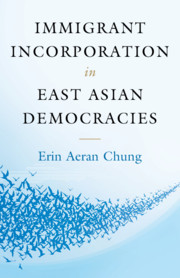Book contents
- Immigrant Incorporation in East Asian Democracies
- Immigrant Incorporation in East Asian Democracies
- Copyright page
- Dedication
- Contents
- Figures
- Tables
- Acknowledgments
- Conventions and Abbreviations
- Introduction
- 1 How Civic Legacies Shape Immigration Politics
- 2 Constructing Developmental Citizens in East Asia
- 3 Civic Legacies and Immigrant Incorporation in East Asian Democracies
- 4 “I Can’t Be Tanaka”
- 5 Marriage and Migration
- 6 Multiculturalism with Adjectives
- Epilogue
- Book part
- References
- Index
2 - Constructing Developmental Citizens in East Asia
Published online by Cambridge University Press: 24 September 2020
- Immigrant Incorporation in East Asian Democracies
- Immigrant Incorporation in East Asian Democracies
- Copyright page
- Dedication
- Contents
- Figures
- Tables
- Acknowledgments
- Conventions and Abbreviations
- Introduction
- 1 How Civic Legacies Shape Immigration Politics
- 2 Constructing Developmental Citizens in East Asia
- 3 Civic Legacies and Immigrant Incorporation in East Asian Democracies
- 4 “I Can’t Be Tanaka”
- 5 Marriage and Migration
- 6 Multiculturalism with Adjectives
- Epilogue
- Book part
- References
- Index
Summary
Building on Gerschenkron’s (1962) theory of late development, this chapter explores how the timing and context of political economic development among East Asian “late developers” shaped the construction of their citizenship regimes and, later, their immigration policies. I identify the formation of distinct civic legacies that emerged from nationally specific trajectories of citizen-making: local, grassroots movements in Japan; national, rights-based movements in South Korea; and ethnicity-based coalitions in Taiwan. This chapter thus seeks to highlight the macro-level foundations for the development of citizenship and non-citizenship in East Asian democracies that, I argue, are rooted in political economy rather than in cultural traditions. In contrast to dominant approaches that take a dichotomous view of citizenship and non-citizenship or that assume that citizenship is universal and democratic, this book treats citizenship as a contested institution and set of practices negotiated by state and non-state actors to demarcate formal membership in a nation-state that are tied to patterns of mobilization and exclusion in a country’s political economic development.
Keywords
- Type
- Chapter
- Information
- Immigrant Incorporation in East Asian Democracies , pp. 33 - 49Publisher: Cambridge University PressPrint publication year: 2020

